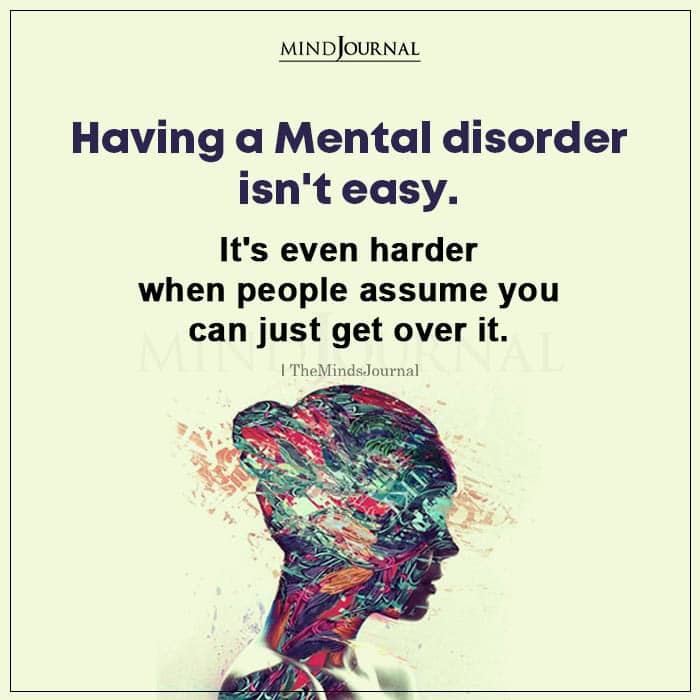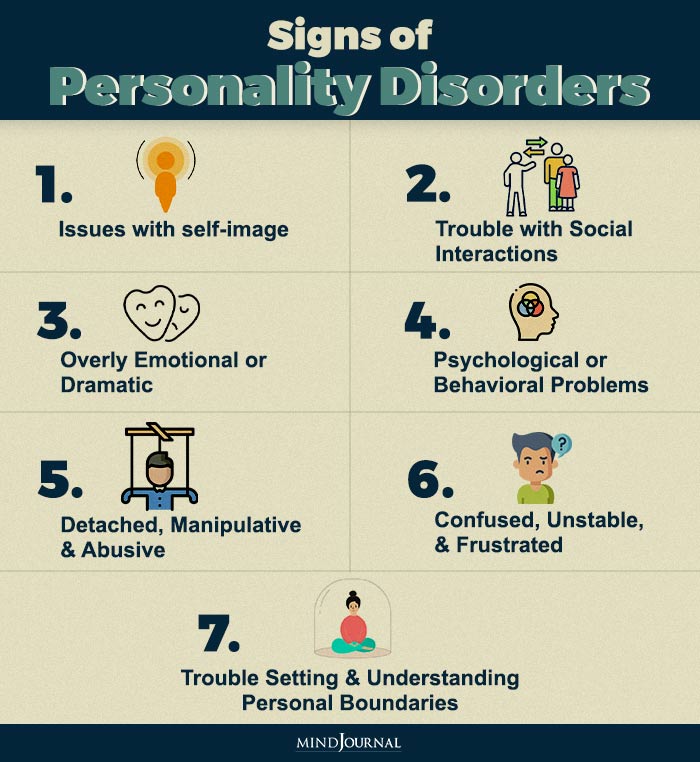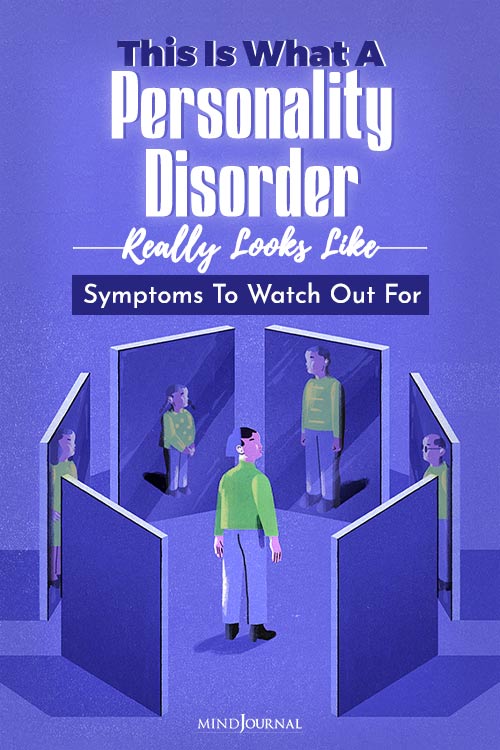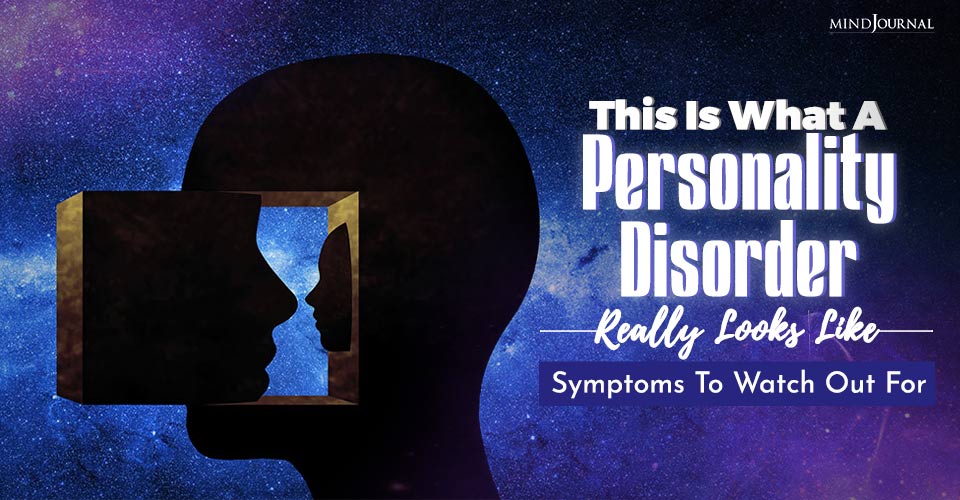Are you or a loved one experiencing unhealthy thought patterns and unexpected behaviors? Individuals suffering from personality disorders think, behave and function differently from others. Although it can be difficult to tell if someone is coping with a mental illness, certain symptoms can act as warning signs.
What are personality disorders?
Personality disorders (PDs) refer to a complex group of mental illnesses that can adversely affect our thought and behavior patterns. Sufferers tend to experience rigid and unhealthy thoughts, emotions and behaviors which affect various aspects of their lives, such as education, career, relationships, social interactions etc. They also find it difficult to deal with daily stressors & challenges.
A recent study explains “Personality disorders are pervasive, maladaptive, and chronic patterns of behavior, cognition, and mood.” It makes us develop a distorted perception of our reality, react abnormally and leads to impaired functioning. Research also shows that sufferers are prone to emotional, behavioral, interpersonal dysregulation, intimate partner violence and comorbid mental disorders. PDs have been described as “a disease in disguise” and are associated with poor health, inferior quality of life and premature mortality.
PDs can affect the following aspects of our lives –
- How we perceive and think about ourselves & others
- How we emotionally react to internal and external factors
- How we manage and regulate our emotions
- How we relate to, connect and interact with others
Studies reveal that about “10% of people in the general population” are affected by this complex mental health problem. Onset is typically experienced during adolescence or early adulthood. However, it can often be difficult to to realize that you or a loved one may have this disorder as your thoughts, behaviors and actions will seem natural to you. This is why it is crucial that you learn to identify the early signs of personality disorders.
Related: The 16 MBTI Personality Types

Types of personality disorders
Before we can delve into the warning signs of PDs, we need to gain a better understanding about the different forms through which this group of mental illnesses may manifest in someone. Personality traits tend to lie on a spectrum. There are different types of personality disorders which can manifest differently in individuals.
According to the Diagnostic and Statistical Manual of Mental Disorders, 5th Edition (DSM-5), PDs can be classified into 3 clusters and categorized into 10 different types, namely –
1. Cluster A personality disorders
People belonging to this cluster are regarded as eccentric, suspicious and odd. They find it hard to trust others, see daily challenges as threats and are unable to trust others. Cluster A includes the following disorders –
- Paranoid personality disorder (distrust & suspicion)
- Schizoid personality disorder (disinterest in interpersonal relationships)
- Schizotypal personality disorder (odd & eccentric thoughts & behaviors)
2. Cluster B personality disorders
Cluster B is marked by erratic, dramatic and overly emotional behavior. Sufferers tend to have poor self-image and severe, yet unstable emotions. They behave impulsively, are unable to manage relationships and control their emotions. These disorders involve:
- Antisocial personality disorder (manipulation, disregard for other people & social irresponsibility)
- Borderline personality disorder (emotional dysregulation, emptiness & unstable relationships)
- Histrionic personality disorder (overly emotional & attention seeking)
- Narcissistic personality disorder (manipulation, excessive self-importance & lack of empathy)
3. Cluster C personality disorders
These disorders are identified as anxious/avoidant PDs as sufferers tend to be fearful or anxious in general. They are mostly introverted, have low self-confidence, avoid relationships due to insecurities, tend to be perfectionists and may allow others to dominate them. Cluster C includes the following conditions –
- Avoidant personality disorder (rejection sensitivity, avoidance of relationships)
- Dependent personality disorder (neediness and submissiveness)
- Obsessive-compulsive personality disorder (stubbornness, rigidity & perfectionism)
Related: 9 Toxic Personality Types And How to Deal With Them
Are you experiencing symptoms of personality disorders?
A person suffering from a personality disorder may not be able to realize that they may have some psychological or behavioral problems. They often appear to be confused, unstable, and frustrated with others surrounding them. They may also have trouble setting boundaries for themselves and understanding personal boundaries set by others. They tend to have excessively high or low self-esteem which significantly affects their behavior and relationships. A person with PDs can be detached, overly emotional or dramatic, manipulative, abusive and have an unhealthy parenting style. As a result, they usually have toxic relationships with their partners and children. Moreover, it can also lead to medical and psychological issues in the sufferer’s spouse and/or children.
Personality disorders can be typically identified by the following primary signs, as per the DSM-5 –
1. Issues with self-image
People with PDs may have self-image issues and an inconsistent self-identity. If you are suffering from a personality disorder then you may have difficulty deciding whether you are cruel or kind. As your self-perception fluctuates repeatedly, you will have self-contradicting and unpredictable appearances, behaviors, goals and values.
2. Impaired interpersonal functioning
Interpersonal functioning refers to our ability to be empathic, have congenial interactions with others and cope with interpersonal problems. However, when you have PDs, you may have trouble with social interactions, become unable to build or maintain close relationships, lack empathy and be insensitive towards other people.
Related: 15 Everyday Habits That Gives Away Parts of Your Personality
Signs of personality disorders

As personality disorders include a wide range of conditions, the best way to identify the early signs is by looking at the disorders separately rather than as a cluster of disorders. Below the symptoms of each specific disorder is detailed. It is not necessary that you have to relate to all the signs of a specific disorder in order to be diagnosed. Moreover, you should also remember that all of us tend to have certain behavioral issues and unhealthy thoughts at times, but people with personality disorders experience the symptoms repeatedly in damaging ways.
Here are the symptoms of each specific personality disorder from the 3 different clusters (Cluster A, Cluster B & Cluster C) –
1. Paranoid personality disorder
Paranoia, suspicion and distrust are the primary symptoms of this condition. Here are some of the other most common symptoms of paranoid personality disorder:
- Intense paranoia
- Persistent suspicion and mistrust of others, including loved ones
- Irrational belief that people are trying to deceive, hurt or harm you
- Hesitance and reluctance to talk openly with others due to doubt & fear
- Perceiving non-threatening gestures and remarks as personal attacks
- Holding grudges for a long time
- Believing or doubting that intimate partner or spouse is unfaithful
- Aggressive behaviors or hostile emotional reactions to perceived threats
- Inability or disinterest to consider others’ perspectives
- Constantly distrusting others’ motives and intentions
- Shifting blame on others even in the presence of contradicting evidence
- Overthinking & jumping to conclusions
Related: The Paranoid Partner: 20 Behavioral Traits of A Paranoid Personality in Relationships
2. Schizoid personality disorder
If you are suffering from this disorder, you may become detached, indifferent & distant in relationships. People with schizoid personality disorder may show these signs:
- Preference for solitude and spending time alone
- Disinterest in personal or social relationships
- Inability to enjoy social or other daily activities
- Inability to understand general social cues
- Indifferent or cold towards other people
- Difficulty managing intimate relationships
- Lack of libido or interest in sexual activities
- Social withdrawal or isolation
- Inability to express a wide range of emotions
- Prone to daydreaming
- Inability to accept criticism or compliments
- Lack of motivation
3. Schizotypal personality disorder
Abnormal thoughts, behaviors and appearances are the common symptoms of this personality disorder. Schizotypal personality disorder may also manifest through the following signs:
- Superstitious or odd beliefs and delusional thoughts
- Peculiar behavior
- Unusual manner of dressing
- Incoherent speech
- Limited and inappropriate emotional responses
- Social anxiety or discomfort with intimate relationships
- Strange perceptual experiences, like hearing whispers
- Magical thinking or believing that you can influence the outcome of events simply by thinking
- Indifference or inappropriate reaction to other people
- Believing particular events carry secret messages targeted only at you
- Anxiety and/or depression
- Paranoia and suspicion
4. Antisocial personality disorder
People with this condition tend to be reckless, impulsive, deceiving, aggressive and prone to violence. Common signs and symptoms of antisocial personality disorder include:
- Repeatedly disregarding or violating others’ rights, feelings or needs
- Inability to abide by social norms
- Lack of remorse for behaviors or actions
- Prone to criminality and illegal behaviors
- Violent or aggressive behavior
- Persistently irresponsible
- Prone to pathological lying, being deceitful & conning others
- Difficulty maintaining a stable career
- Constant issues with close personal relationship
- Frequent problems with the law or authority
- Inability to learn from mistakes
- Shifting blame on others for their own mistakes
Related: D.I.Y. Guide to a Sociopath’s Brain and Psyche
5. Borderline personality disorder
Also known as emotionally unstable personality disorder (EUPD), it leads to poor self-image, mood swings, intense emotions, severe anxiety, impulsive behavior and chaotic relationships. Symptoms for borderline personality disorder involve the following:
- Instability in personal relationships
- Hypersensitivity to rejection
- Strong emotions & unstable moods
- Distorted self-identity and poor self-image
- Impulsive behaviors, such as substance abuse, sexual promiscuity, overspending, gambling etc
- Persistent feelings of emptiness
- Intense and inappropriate display of anger
- Repeated self-harm and suicidal tendencies
- Severe anxiety and depression
- Loss of contact with reality
- Intense emotional reactions to stressors
- Trouble with self-regulation
6. Histrionic personality disorder
Individuals with this disorder tend to seek attention constantly and are overly concerned about their appearance. They prefer being the centre of attention and experience anxiety when ignored. Symptoms include the following:
- Excessive attention and emotion seeking
- Overly emotional, dramatic and childish
- Emotional or sexually provocative behavior to get noticed
- Shallow and manipulative
- Constantly shifting mood and emotions
- Overly concerned with physical appearance
- Sensitive to criticism
- Lacks concern for others
- Easily swayed or influenced by others
- Suicidal tendencies
- Considers relationships & friendships as more intimate than they truly are
- Expresses self in exaggerated, dramatic or theatrical ways
7. Narcissistic personality disorder
People with narcissistic traits lack empathy and constantly need admiration from others. They have a strong sense of self-importance, grandiosity and entitlement. Common signs for this personality disorder include:
- Inflated sense of self-importance
- Desperately seek admiration, praise and attention constantly
- Manipulative, self-centered and selfish
- Low self-esteem
- Lack of empathy and inability to acknowledge others’ needs or feelings
- Arrogance and belief of being special or entitled
- Exaggeration of talents or accomplishment to uplift reputation
- Envious of others or thinking that others envy them
- Unrealistic expectations from others
- Abusive behavior, such as constant criticism, bullying, gaslighting etc
- Grandiose thinking & fantasies about attractiveness, fame, achievements, wealth and power
- Exploiting others without remorse or guilt
Related: Histrionic Narcissists: How They Use Sex And Lies As Weapons Of Manipulation

8. Avoidant personality disorder
This is one of the types of personality disorders that makes you feel afraid of being rejected, criticized and ridiculed. People with this mental illness tend to be shy, self-conscious and have feelings of inferiority. Here are some symptoms of this disorder:
- Avoidance of social interactions or connections due to fear of rejection
- Excessive sensitivity to criticism or disapproval
- Extreme shyness and social inhibition
- Difficulty making relationships or friendships
- Inability to try new things due to fear of embarrassment before others
- Intense feelings of inadequacy and inferiority
- Low self esteem
- Prone to excessive self-criticism
- Lack of social abilities
- Constant worries about being judged or negatively criticized
- Seeks affection but afraid of rejection
- Frequently feel inept and isolated
9. Dependent personality disorder
People with this personality disorder tend to become dependent on others. They need other people to take care of them and make decisions for them. These individuals are typically clingy and submissive. Common symptoms of this condition include:
- Extreme dependence on other people
- Clingy, needy and submissive behaviors
- Low self-confidence and poor self-esteem
- Fear of abandonment & separation
- Constantly seeks reassurance from others
- Inability care for self and needs to be taken care of
- Inability to disagree with others
- Tendency to avoid responsibilities
- Prone to tolerating abuse, bullying and mistreatment
- Highly sensitive to criticism, disapproval and even positive feedback
- Pessimistic outlook on life
- Inability to make decisions for self or do things by self
Related: Codependency: 5 Types Of Codependent Personalities
10. Obsessive-compulsive personality disorder
Although similar, obsessive-compulsive (anankastic) personality disorder is different from obsessive compulsive disorder. This condition involves an obsession with control, orderliness and perfection. People with this personality have unrealistic expectations from themselves. Here are some signs to watch out for:
- Preoccupation with orderliness, control, schedules, rules and details
- Excessive perfectionism causing stress and dysfunction
- Strong need to be in control
- Stubbornness, rigidity and anger
- Extremely strict about values, morality or ethics
- Hoarding or inability to discard useless items
- Excessive control over finances and expenditures
- Extreme commitment to work leading to avoidance of loved ones or pleasurable activities
- Refusal or unwillingness to accept help from other people
- Extreme attention to detail
- Formal and rigid mannerisms and behavior
- Inability to have a flexible mindset or attitude
Seek help
If you can identify the generic symptoms of personality disorders or the signs of a particular disorder in yourself or in a loved one, then seeking professional help is highly recommended. If you can relate to a handful or most of the signs mentioned above, then consulting a doctor will help you get a proper diagnosis and the right treatment.
When left untreated, personality disorders can lead to long-term adverse effects and impair your ability to function in your daily life. However, with effective treatment, you can overcome your symptoms, improve your mental health, build stronger relationships and lead a healthier life.
Related: 10 Signs Your Mental Health Is Finally Improving
Frequently Asked Questions (FAQs)
Who are some fictional characters with paranoid personality disorder?
Some of the fictional characters with PPD are, Willy Wonka (Charlie and The Chocolate Factory), Young Bobby (Pawn Sacrifice), Courage (Courage The Cowardly Dog), etc.
Who are some fictional characters with dependent personality disorder?
Byron “Buster” Bluth from Arrested Development, Debby Miller from Hysterical Blindness and Hedra Carlson from Single White Female are some of the examples of fictional characters with DPD.
Who are some fictional characters with schizoid personality disorder?
Some of the examples of fictional characters with SPD includes Sheldon Cooper from Big Bang Theory, Kramer from Seinfeld, the English butler from The Remains of the Day (1993.) and Doc Brown from Back to the Future.
Is multiple personality disorder and dissociative identity disorder same?
A split or multiple personality is also known as to dissociative identity disorder (DID), which is a mental disorder in which a person has two or more personalities.











Leave a Reply